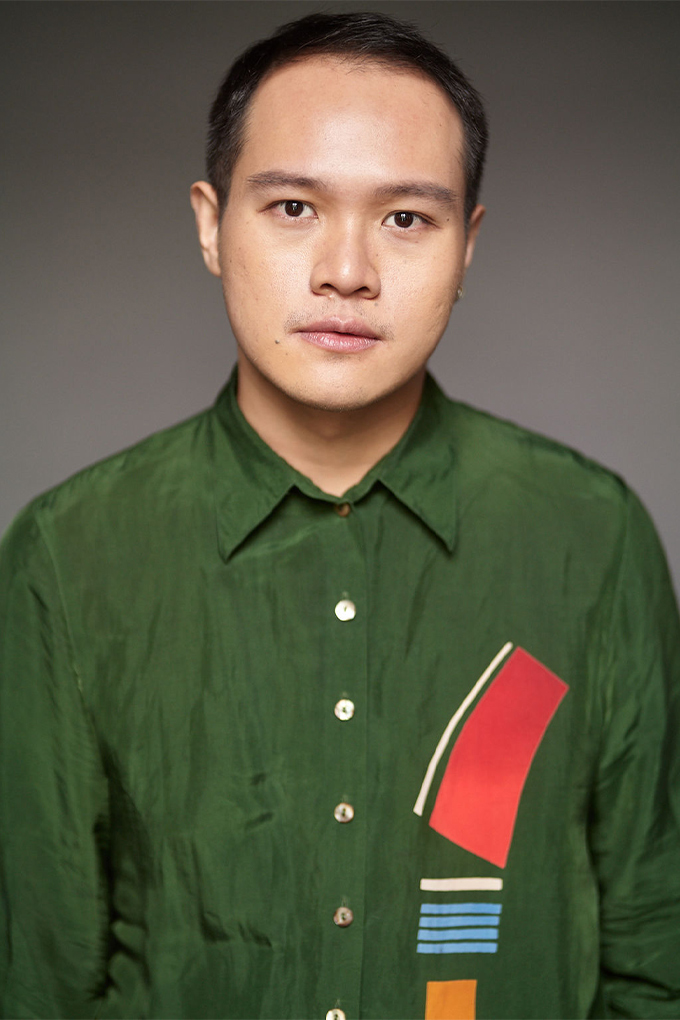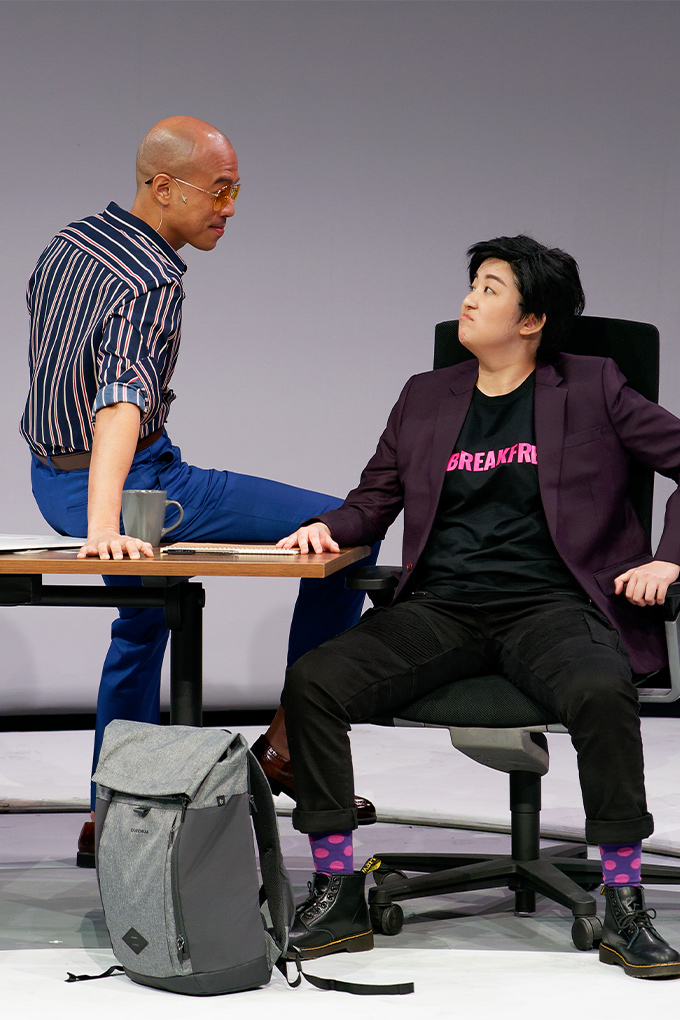In Wild Rice’s G*d is a Woman, a group of artists—angered by the moral outrage of the self-righteous and the severe system of censorship in Singapore—start a fake petition to cancel Ariana Grande’s upcoming ‘God is a Woman’ concert. If there’s anyone daring and thorough enough to go after these sanctimonious people, after all, it’s the devoted fans. But when things get out of hand and the concert actually comes under threat, the campaign to save the show has to go against the some of the most formidable opponents in Singapore: the powerful and easily offended.
It’s a hilarious premise, brought to life through an incisive script and an exceptional cast. The absurdity of the situation is impossible not to laugh at—and yet, peppered throughout the production are recognisable moments that act as sobering reminders of the ways in which the play mirrors the society we live in.
“There’s an absurdity to life and politics in Singapore, where the threshold for offence is so low—sometimes you just have to laugh at it”
“The immediate impetus for the play was the incident in 2019 when Swedish heavy metal band Watain had its Singapore concert licence revoked on the day of the performance, after people complained that their lyrics were anti-Christian. Shortly after that, there was an image of a list distributed in Parliament that got circulated around, of lyrics that could be considered contentious, and Ariana Grande’s ‘God is a Woman’ was on that list,” explains playwright Joel Tan. “That, combined with a play idea that I had for a while—about a situation where a work of art gets censored, and artists have a troll-like response to it—made everything click into place.”
As one of Singapore’s most prominent young playwrights, Tan is painfully familiar with the struggles that the local arts industry faces with censorship. “Working in this field, you’re exposed to many brushes with censorship regulations, and I’ve had very close friends come face to face with this in damaging ways,” he shares. “In 2016, the M1 Fringe Festival came under attack. There were two shows in the line-up that featured nudity in quite a big way. During the licence review process, people stumbled upon those two works in the festival brochure. They campaigned against them, and eventually those shows were pulled from the programming. That incident has always stuck with me. I remember feeling very upset at that time, and I’ve always wanted to write a response to it.”
That response now takes the form of G*d is a Woman—devastatingly funny in spite of its heavy subject matter, and written with great nuance. Below, Tan opens up about why he chose to make the play a comedy, the process of getting it approved and the reasons he believes it will remain relevant for years to come.

Congratulations on the opening of G*d is a Woman. How do you feel now that the show has opened?
I feel relieved, and quite delighted because the responses have been very warm. When you write a comedy, you’re always worried that people won’t find it funny. But the responses so far have been rapturous, and people have been saying that the play hits close to home and that they’ve found it quite powerful—so I’m glad to know that, in terms of both comedy and messaging, the play is doing what I hoped it would.
The incidents that inspired you to write this took place years ago, yet the play still feels incredibly relevant to a lot of recent events—like what happened with The 1975 at the Good Vibes music festival in Malaysia. Why do you think that is so?
There’s a sort of autocratic constant in Singapore. Various things can change in the superstructure—we can appear to be more tolerant in this way, or relax a bit in that way—but the fundamental constant is an anxiety over control. As long as that doesn’t change, people are always going to be wringing their hands over things like free speech, and having elaborate public contests over what is tolerable and what is not.
In regards to The 1975, there’s this idea of these big concerts featuring people from the west coming with their supposed western values. That’s always going to brush up against the state of affairs in this part of the world, where liberal beliefs and moralities are still in contestation. We haven’t fully resolved how we feel about these things publicly, and I would argue that a big reason why is because, especially in Singapore, there is a lack of openness to having such conversations in a constructive way. If you look at what happened with Subhas Nair recently, for example, I find it offensive that he’s being charged and sentenced to jail for essentially responding to racism in what I thought was a totally apt way. The conversation surrounding race is so behind the times here compared to liberal discourses in other parts of the world, and that goes back to this anxiety and desire to control the way the public has these conversations. And so, we’re always going to be stuck with mudslinging and petition writing—and a play like that probably will remain relevant for a while to come.
A lot of the conversation surrounding censorship and moral outrage comes with a lot of anger, frustration and negative emotion. What was the thought process behind making the play a comedy?
The instinct to make it comic feels very natural to me. When you’re in the moment, these things feel infuriating, offensive and so deeply violent. You can’t imagine ever finding them funny. But when you step away from it, you start to recognise patterns of behaviour, and you begin to find the whole thing just ludicrous. There’s an absurdity to life and politics in Singapore, where the threshold for offence is so low. Sometimes you just have to laugh at it. It isn’t necessarily a happy laugh. I think it’s the kind of laugh that can be quite bitter. Increasingly, I’ve been thinking about what I want to bring to the theatre, and I’m beginning to feel like it’s this kind of savage comedy. It’s important to me to create an outlet for people where they can laugh about these things.

What was the approval process like?
I was surprised by how banal the things that the authorities flagged were. When they came back to us, they highlighted small details like individual words that they argued implied certain things about certain groups in Singapore. If I recall correctly—and it’s been a while since we’ve had these conversations, so I might be wrong—they highlighted the word ‘powerful’ being used to describe the group campaigning against the concert. They said it implied that these people had a political agenda or undue amount of power in the country, or something of that flavour. I remember thinking, “That’s a pretty big leap of imagination to think the audience is going to come to those conclusions when they hear that word, but not due to the bigger picture of the play.” That was the level of conversation we were having. I found that a bit odd, but I was also relieved because it could have been a lot worse.
Do you think it signals anything about the state of censorship in Singapore that this play could be staged?
I have mixed feelings about it. On one hand, it worries me as a playwright that this has been staged without issue, because it makes me wonder if the play really is pushing any boundaries. Are we still operating within something quite safe? Is the play only creating an illusion of subversion? On the other hand, I have people coming up to tell me that they can’t believe we’ve gotten this script through the censors, so it clearly feels quite challenging and confronting for some. I’m not sure what that signals about the state of anything. The thing about Singapore is that our boundaries are always shifting. Apart from a few specific guidelines, you never know what you can get away with.
I also wonder if the theatre is no longer seen as a dangerous platform. The audiences that come to the theatre generally already believe in certain values, and for me, that is a double edged sword. It does feel a bit like preaching to the converted, but it’s also important to hold space for people who feel these frustrations and to provide a place for them to vent and laugh. But I don’t think anyone can ever really look at the state of affairs in Singapore and say that things are changing.

As an artist, how do you navigate the line between what you want to write about and what you’re allowed to?
As I’ve gotten older, I care less. I just write what I want, and let the pushback come after. That’s not to say I write to be contentious—it’s not in my practice to do that—but it’s interesting to find out what is and is not considered controversial. As an artist, it’s about giving myself room to explore many different facets of the subjects that interest me.
What are the conversations that you hope this play will start?
I don’t have any great hopes for what conversations people will have about it. The conversations I’ve heard so far have ranged from brushes with censorship regulations to the culture in the civil service, and even egotistical personalities in the arts. If anything, I hope audiences feel a sense of catharsis and healing after watching the show.
What are you most excited for audiences to see in G*d is a Woman?
I’m excited for them to be taken on the emotional journey of the play—which starts off in this flippant, slightly bonkers comic war, but ends in a place that I find quite tender and hopeful.
What has been the most meaningful part of creating and staging G*d is a Woman?
It’s been quite a long time since I’ve written a new play for a Singapore audience. I was working in the UK for a bit, and after I returned, the last big project I did was an adaptation of Tartuffe last year. That’s a classic French play, so I didn’t really think of it as one that I wrote. It’s been very nice to become reacquainted with the local audience—and to do it in such a beautiful theatre, where you are close enough to hear and feel every reaction, has been special.
Working with Ivan has also been very exciting. We’re friends, but we’ve never worked together in this capacity before. It feels like a full circle moment, because he was there at the start of my career as well. The actors are also phenomenal, some of whom I have not worked with in a very long time. It all feels a little bit like coming home.
Purchase a ticket for Wild Rice’s G*d is a Woman here.





